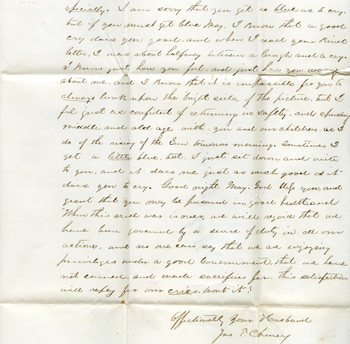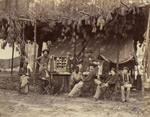Click Center Image for Full Size Picture
News from home. No matter the form—letter, phone call, email—communication with loved ones is one thing soldiers both past and present look forward to receiving. Likewise, those back home have relied on a word from the front to keep them going. In the Civil War, mail delivery could be unreliable, and weeks could go by between letters. Both the soldiers and their families expressed being anxious for news. On January 3, 1863, Cheney wrote that he had received no mail since November 15.
Soldiers would snatch spare minutes to scribble a note home, or fill long, lonesome hours with writing lengthy letters. They would use the back of a book, the side of a box, or the trunk of a tree as something to write against. Cheney noted in a May 14, 1862, letter that he was sitting on a camp stool using a company book as a writing surface.
In his letters, Cheney described his life in the Army. He offered advice on family finances and shared news about other relatives, especially his brothers serving with units from New Hampshire. Cheney often asked about his son and daughter. He was worried that his young daughter, Grace, might not know him when he returned home from war.
Soldiers, including Cheney, requested news from their home towns and likenesses of family members. When Cheney was stationed near St. Louis, he made a special effort to have a photograph taken to send home to Mary. Often, there was a plea for more mail. In the soldiers' view, there could never be too much mail.
Camp Sherman, Mississippi.



